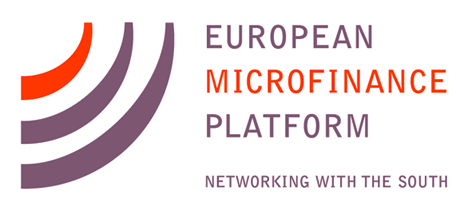During  a European Microfinance Week session on village savings and loan associations (VSLAs), speakers from several affiliates of Switzerland-based CARE International described their organizations’ responses to the COVID-19 pandemic. As the pandemic set in, they surveyed members of VSLAs, which commonly include 30 women, in various formats to learn how they were adjusting to the pandemic and what support they need.
a European Microfinance Week session on village savings and loan associations (VSLAs), speakers from several affiliates of Switzerland-based CARE International described their organizations’ responses to the COVID-19 pandemic. As the pandemic set in, they surveyed members of VSLAs, which commonly include 30 women, in various formats to learn how they were adjusting to the pandemic and what support they need.
Maryam Garba Usman of CARE Nigeria described her organization’s survey of 100 VSLAs, largely via an interactive voice response telephone system. The team also used a mobile app to distribute information on COVID-19 and a range of gender-related issues. Most groups continued to meet in person, incorporating social distancing. In addition to accessing financial services, VSLA members addressed problems such as gender-based violence, child marriage, interruptions to children’s education and how to boost adult learning. CARE Nigeria was also successful in leveraging VSLAs to deliver recovery funds that the organization secured from the government.
Clement Bisai of CARE Malawi noted that the pandemic has pushed the organization and the VSLAs it supports to use phones more in lieu of in-person communication. This allowed for surveys through which members reported an increase in gender-based violence since the onset of COVID-19. The pandemic also increased the urgency of connecting VSLAs to formal financial services providers due to members’ increased financial needs. In addition, CARE Malawi used VSLAs as a channel to distribute personal protective equipment.
Muhamed Bizimana of CARE Haiti noted that his country was affected later than others by the pandemic, giving Haiti a chance to learn from the experience of others. There was an early awareness that keeping VSLAs functioning during the pandemic could be useful both to respond to immediate household needs as well as to implement recovery processes in the future. Echoing speakers from other regions who spoke at the opening session of European Microfinance Week, Mr Bizimana noted that Haiti had been suffering from political and humanitarian crises before the pandemic, which made it less of an emergency in some ways.
Surveying members electronically would have been off-putting to many in Haiti, where in-person surveys are the norm. Thus CARE Haiti used a combination of digital data collection and in-person surveys via VSLA facilitators. The results indicate that men tend to rely on radio and the Facebook service Whatsapp to monitor news about the pandemic, whereas women were more likely to get information from one-on-one interaction, including via VSLA meetings. Some of these groups adapted to COVID-19 by cutting their weekly 30-person meetings to groups of 15, then later 10. To do this, the VSLA committee stays at the meeting location while sub-groups come through one-by-one to conduct business. “VSLAs remained at the heart of members’ wellbeing because they are the source of money for meeting their daily needs,” said Mr Bizimana.
Ms Usman echoed Mr Bizimana in describing the combination of technology and in-person communication that CARE Nigeria used for surveys in her country. Staff members also used an app to reach group members because community trainers did not have the capacity to reach each member individually. Meanwhile, the groups and their members have started to take on a range of leadership roles – both inside and outside the home. “Women have begun to make changes in the community and in households, participating in household decisions and community decisions,” said Ms Usman. They have been managing new hand-washing stations to reduce disease transmission. They have accessed national government programs promoting women’s empowerment. They are bringing community requests to local government, such as regarding the need for vocational centers. VSLAs are also forming state-wide and national associations to increase their visibility and effectiveness.
Regarding lessons learned, Mr Bizimana said he would have preferred to have had a mechanism encouraging people to save a portion of their COVID-19 relief funds – at rate of 10 percent, perhaps – in order to nurture the culture of saving. He also is ready to see less emphasis on CARE staff delivering services, instead trusting local stakeholders more regarding the quality of services they will provide. He said, “VSLA and village agents are really at the center of the adoption of new technologies and processes.” They have a working relationship that can be leveraged efficiently to implement new initiatives – both for adoption and scale-up.
This feature is part of a sponsored series on European Microfinance Week 2020, which took place online from November 18 through November 20. The event is held annually by e-MFP. MicroCapital has been engaged to promote and report on the conference each year since 2012.
Sources and Additional Resources
Podcast by Mr Bisai of CARE Malawi
https://careinternational.podbean.com/e/data-in-the-time-of-covid/
European Microfinance Platform (e-MFP) information on European Microfinance Week 2020
http://www.e-mfp.eu/european-microfinance-week-2020
MicroCapital coverage of European Microfinance Week, including the European Microfinance Award
https://www.microcapital.org/category/european-microfinance-week/
Similar Posts:
- SPECIAL REPORT: How to Achieve Responsible Digital Financial Services: European Microfinance Week Opens
- SPECIAL REPORT: Fintechs vs MFIs – a Debate at European Microfinance Week
- SPECIAL REPORT: e-MFP Green Inclusive and Climate Smart Finance Action Group Focuses on Capacity Building
- SPECIAL REPORT: Saluting MFI Staff, Promoting Flexible Products, “Keeping the Client at the Heart” as European Microfinance Week Closes
- SPECIAL REPORT: Leveraging Financial Inclusion to Get Food Security Back on the Increase #EMW2023
